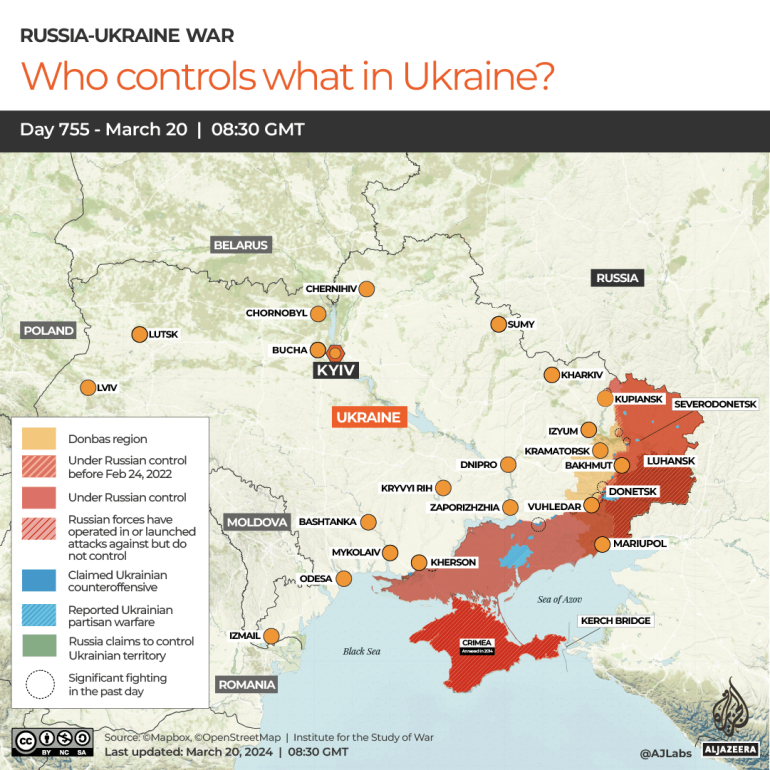Olena Rozumovska is at the end of her rope.
Her two-bedroom apartment in an Soviet-era concrete building has no electricity or water supply, and the central heating is off after Russian drones and missiles struck Kharkiv, Ukraine’s second largest city, on Friday.
“It’s unbearable, impossible. I want to howl with despair,” the 33-year-old, whose husband, Mykhailo, is fighting against Russian forces in southeastern Ukraine, told Al Jazeera over the phone.
The outdoor temperatures in Kharkiv barely rose above freezing on Friday, a cold drizzle was falling, and her apartment building “is losing warmth”, she said.
Early in the morning, she jumped out of bed on hearing the thud of a powerful explosion. More than a dozen heavy, blood-curdling blasts followed as she hid in the frigid basement with her two children, Bohdan, who is seven, and four-year-old Roxana.
The children were “hysterical” because they had to leave their Siamese cat behind. Their pet, named Monya, wouldn’t come out from under the sofa.
What roiled her and millions of Ukrainians was the scope of the bombardment, which became the largest strike on their nation’s energy infrastructure since the war began in 2022.
“The aim is not just to destroy but to try yet again, like last year, to cause a massive disruption of the energy infrastructure,” Energy Minister Herman Halushchenko wrote on Facebook.
In the winter of 2022-2023, Moscow switched to massive shelling that targeted energy infrastructure and civilian sites after realising that its blitzkrieg to take over all of Ukraine had failed.
Friday’s attacks with about 60 drones and 90 missiles killed at least two people, wounded scores, struck Ukraine’s largest dam and severed the power supply to the Russia-occupied Zaporizhzhia nuclear plant, officials said.

Ukrainian President Volodymyr Zelenskyy rebuked the West for months-long delays in military aid.
“Russian missiles have no delays, unlike aid packages for Ukraine. [Iranian-made] ‘Shahed’ drones have no indecision, unlike some politicians. It is critical to understand the cost of delays and postponed decisions,” he posted on X, formerly known as Twitter.
Energoatom, Ukraine’s main nuclear agency, said the Zaporizhzhia plant was “on the verge of blackout” because the strike knocked offline the main power line.
Russia seized the plant in March 2022, but failed to redirect its electricity flow to energy-starved Crimea.
The plant’s reactors have been shut down but need a constant power supply to keep them cool and prevent the melting of uranium fuel rods.
Within hours, the severed line was reconnected, a source at Energoatom told Al Jazeera.
“This is the main power line. There’s also a reserve one, and if only the latter is left, there’s a risk of blackout,” the source said.
Friday’s attack was the second in two days – a change of tactics as Moscow “is looking for maximally effective ways to reach its goals,” defence spokeswoman Natalya Humenyuk said.
“We’re looking for effective means to counter them – and they’re looking for the ways to pressure [and] terrorise,” she said in televised remarks.
“One can hardly remember two attacks for two days in a row. But such an attack was expected after the [presidential] election in Russia”, which was held on March 15-17, she said.
Some analysts disagreed with her assessment.
There is no change of tactics, and the Russian attacks are “business as usual,” Nikolay Mitrokhin at Bremen University in Germany told Al Jazeera.
They are revenge for a string of successful Ukrainian strikes inside Russia, he said.
In recent weeks, pro-Ukrainian battalions of Russian nationalists repeatedly attacked the western Russian regions of Belgorod and Kursk on Ukraine’s border.
They were backed by devastating Ukrainian drone and missile strikes on Belgorod.
On Wednesday, new, advanced Ukrainian drones reached a key airfield in Russia’s Volga region that has been used by strategic bombers to launch missiles on Ukraine.
Moscow said its forces shot down the drones, but Mitrokhin said the attack was “apparently successful”.
More drone and missile attacks destroyed or damaged Russia’s energy infrastructure in recent months.
Since January, Ukraine struck at least nine oil refineries in western Russia – along with depots, terminals and storage facilities – reducing Moscow’s oil-processing capacity by 7 percent, according to a calculation by the Reuters news agency.
On March 13, one of the attacks set afire a refinery in the western city of Ryazan, prompting the shutdown of two refining units. The mammoth refinery produces almost 6 percent of Russia’s refined crude.
A day earlier, another Ukrainian strike halved the capacity of another refinery near the city of Nizhny Novgorod that sits more than 1,000km (621 miles) east of the Ukrainian border.
The attacks dealt a blow to Moscow’s main source of export revenues that fund the war in Ukraine despite crippling sanctions imposed by the West.
Washington urged Kyiv to stop the attacks on the refineries because they may escalate the conflict, the Financial Times reported on Friday.
This week’s double attacks by Moscow’s troops may also pave the way for Russia’s summer ground offensive.
“This could be seen as a new operation that is going to become a prelude to Russia’s summer offensive,” Kyiv-based analyst Aleksey Kushch told Al Jazeera.
Another observer warned that the most serious and worrying strike on Friday was the one that targeted the dam of the twin Dniprovska hydropower stations, Ukraine’s largest.
“Sooner or later, strikes such as these had to take place,” Kyiv-based analyst Ihar Tyshkevich told Al Jazeera.
He said melting snow and ice in the upper reaches of the Dnipro River have already triggered a spring flood that will reach its maximum level within a month.
“Now, imagine if just one dam is hit,” he said.
Russian missiles struck the power station in December 2022 and February 2023. Friday’s attack damaged both power stations and started a large fire.
“However, there’s no danger of the dam being destroyed,” Ihor Sirota, head of the Ukrhydroenergo agency, which runs the stations, told Radio Liberty.
Read More: World News | Entertainment News | Celeb News
Aljazera









